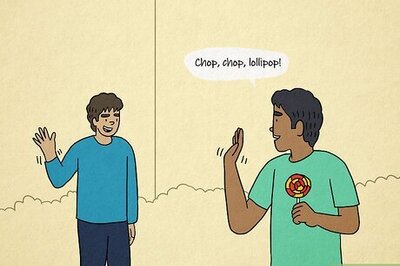
views
United Nations: World leaders at a UN AIDS summit launched a plan on Thursday to try to eliminate by 2015 most new HIV infections among children, who inherit the condition from already infected mothers.
The campaign was launched as the leaders also agreed on a target of reaching 15 million people with HIV treatment, more than double the number who currently get it, also by 2015.
Both goals were announced just weeks after groundbreaking new data showed that early treatment of the human immunodeficiency virus, or HIV, which causes AIDS, can cut its transmission to a sexual partner by 96 percent.
In 2009, some 370,000 children were born with HIV, or one nearly every minute the vast majority of them in 22 countries, almost all in Africa. But providing HIV-positive pregnant women with treatment can reduce the risk of a child being born with the virus to less than 5 percent.
The UNAIDS organization and the US President's Emergency Plan for AIDS Relief (PEPFAR), which are jointly managing the campaign launched on Thursday, said it would aim to reduce the number of child infections by 90 percent by 2015.
"We believe that by 2015 children everywhere can be born free of HIV and that their mothers can remain healthy," UNAIDS Executive Director Michel Sidibe told the launch event, describing the plan as realistic and achievable.
UNAIDS Deputy Executive Director Paul De Lay told Reuters the plan was based on providing pregnant women with more information and on more effective use of anti-AIDS drugs.
"Beginning of the end"
UNAIDS officials said funding from all sources for prevention of mother-child transmission of HIV was currently running at some $500 million a year. They said a total of $2.5 billion more would be needed by 2015 to achieve the campaign's target of eliminating mother-to-child HIV infections.
"Developed countries already do this," U.N. Secretary-General Ban Ki-moon told the meeting. "But we cannot rest until this is true for our whole world."
US Global AIDS Coordinator Eric Goosby said the United States was contributing an extra $75 million to the campaign. Several private companies and foundations also announced contributions.
Achieving the goal could be "the beginning of the end of the story, because that opens the prospect for an AIDS-free generation," Michel Kazatchkine, head of the Global Fund to Fight AIDS, Tuberculosis and Malaria, told Reuters.
Meanwhile, a declaration agreed by the 140-nation UN summit commits governments to "the target of working towards 15 million people living with HIV on antiretroviral treatment by 2015."
The declaration is expected to be adopted on Friday at the end of the three-day summit, which was held close to the 30th anniversary of the discovery of AIDS.
Some 6.6 million were receiving antiretroviral treatment in low- and middle-income countries at the end of 2010, according to UN figures.
Aid group Medecins Sans Frontieres (MSF) called the pledge a "critical step," but said governments needed to take "immediate concrete action" to make the target a reality.
"There are 9 million people waiting for HIV treatment today," Tido von Schoen-Angerer of MSF said in a statement. "This whole AIDS summit will have been a farce if we don't see real plans to ramp up treatment so we can get ahead of the wave of new infections."




















Comments
0 comment